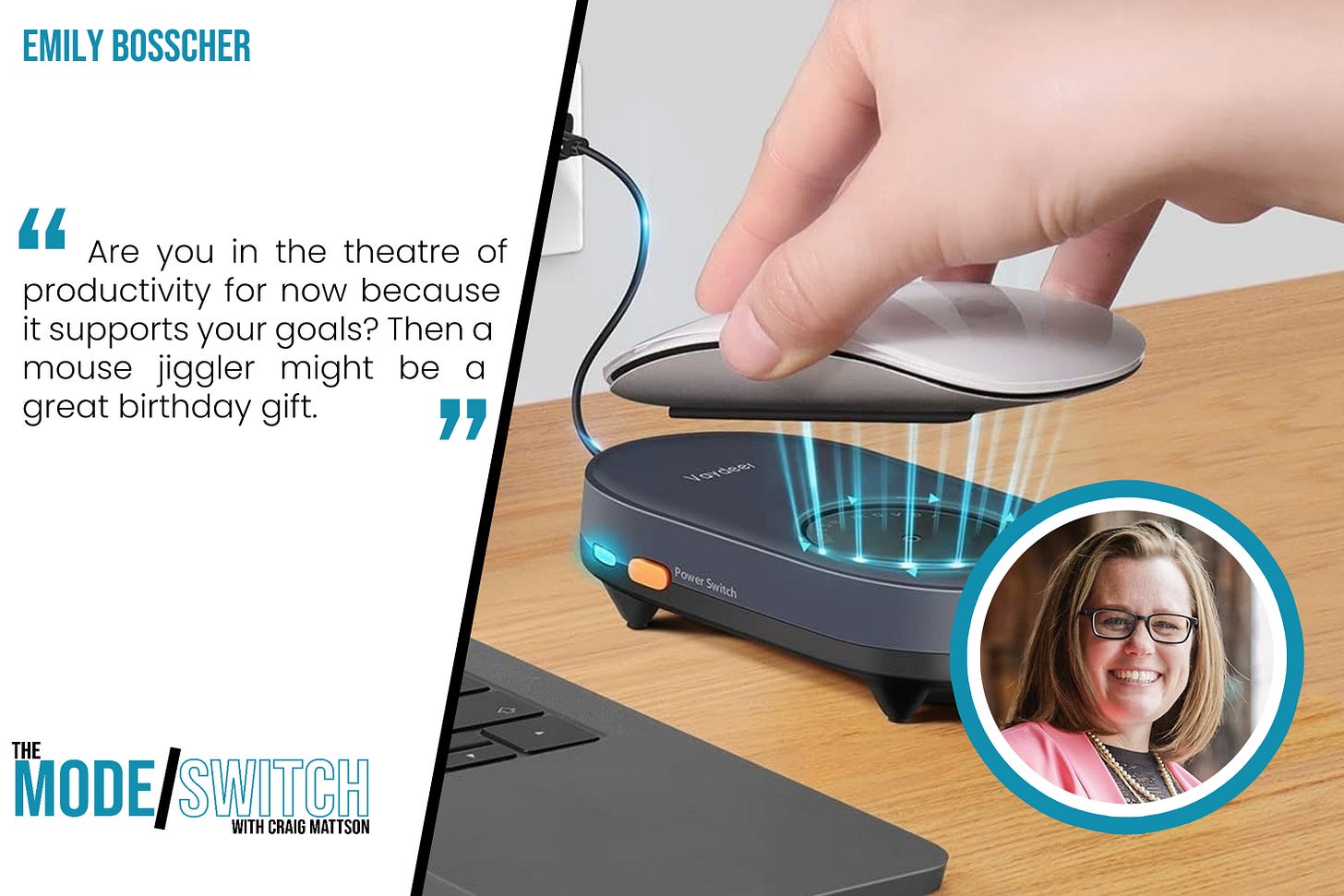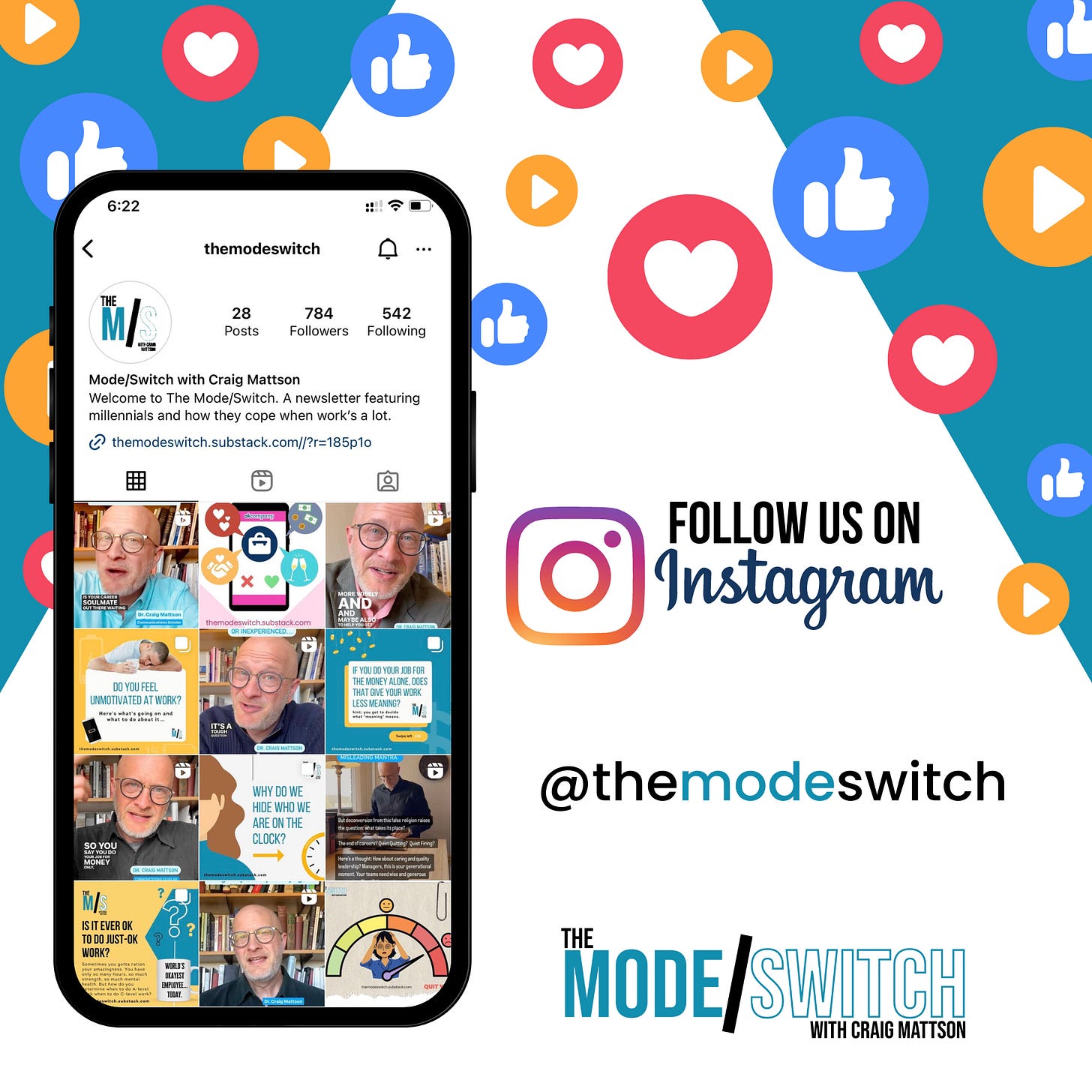This week, contributing writer, Emily Bosscher, discusses the ‘theatre of productivity,’ in which your every movement is increasingly seen as a measure of your workplace usefulness.
A quick Amazon search for “undetectable mouse jiggler” produced a dozen options ranging from $9 to $35, all promising me some variation of guaranteed peace of mind by keeping my computer from snoozing and flipping my Teams status to “away” even if I’m refilling my water bottle or getting in 250 steps before the hour’s up. It simulates real random movement of the mouse! Undetectable to productivity monitoring software when working remotely!
The fact that these products are selling like hotcakes highlights one issue facing Early Career Professionals: productivity paranoia, aka the theatre of workplace productivity. In many spaces (see survey by Visier), employees are pressured to prioritize performance over productivity. Busyness reigns supreme, and 83% of respondents indicated they have engaged in at least one performative workplace behavior in the past year, with 43% spending up to 10 hours a week on: unnecessarily responding to emails immediately, scheduling emails for future delivery, attending unnecessary meetings, keeping laptops active despite not actively working, or doing extra research on a project to extend the time.
Why? According to the Visier survey, 70% said it was to gain attention (or approval) from a direct manager, 39% from peers, 32% from department leads, and 29% from company senior leadership.
Productivity theatre is highest among in-office workers, followed by hybrid workers, and then remote workers. In part, performative expectations are coming directly from managerial modeling, but in part, because technology has allowed distrustful employers to keep track of mouse clicks and little green dots next to employee photos, employees have succumbed by prioritizing visible work or fearfully fooling the system.
Ready for the mode/switch?
If we understood the rhythms of our work, had accurate perceptions of workload, and allowed for variable bandwidth, we might be able to stop this ridiculous behavior of perception over results. Some employers, many exploring 4-day workweeks, are recognizing this truth. But some employers engender this environment through distrust and poor management. The mode/switch is knowing where you fit and what you can do about it.
I hate being bored. But there are days when I watch the weather, waiting for the next meeting, so that I again have work to do. I keep a book in my office to read for this reason, always nonfiction and usually something to stretch me in the research I am currently engaged in. Many times, the book comes out for a few minutes or a few hours on these waiting days.
Unfortunately, I’ve also worked a job where I struggled to productively fill 40 hours of work and felt compelled into the performative theatre to keep my job. I spent as much time as I could preparing for “next steps” or creating as many aesthetically pleasing visuals as I could possibly muster. I made complicated punch lists for projects, I clicked on links and journeyed down rabbit holes, watched training videos until my eyes crossed, and made sure I was “circling back” with co-workers. I set up meetings, then rescheduled them when people canceled. I wrote and rewrote and updated project management timelines that reflected completion goals, setbacks, and time spent waiting on people. And I waited. Waited for responses, waited for materials to be shared with me, waited for meetings where people actually showed up. And weirdly, I waited for my panic to spike and my heart to pound when that computer “ping” pealed while I was waiting, propelling me into looking busy when I wasn’t. The irony? In all of this, I not only completed the work I had been hired for, but I did it on a faster timeline and with greater results than the company had anticipated. Performance over productivity. But I hated it.
What I had was a disconnect between what my employer thought I would be able to do and what I was actually able to accomplish, a workload imbalance, and a culture in which meeting deadlines (performance) was inconsequential while the theatre of productivity was revered. It’s on employers to eliminate these issues through better management, but the reality is that most of you ECPs will be cast in the theatre of productivity whether you want to be or not.
What do you do when you feel you have to deliver empty performances despite being on top of your work? When you want to be genuinely productive for 8 hours a day? When you want to have the opportunity to breathe a bit when your workload is lighter? When you want the completion of your work to signal your success, not whether you looked busy for 40 hours?
I think the answer lies in your understanding of why you work.
Is your work something you are passionate about, a product or service that you deeply care about, work that is fulfilling because it makes a difference in the world? Do you want to do the work, but find that acting in the theatre of productivity seems to be sucking your very soul dry in the day-to-day? For you, finding a different job might be the answer.
Or, is your work something you do for the income and the flexibility it gives you in this season? Maybe it allows you to leave early to coach t-ball or afford to pursue passion projects outside of working hours. Are you willing to participate in the theatre of productivity for now because it supports this lifestyle and overall goals? Then staying put might be the answer, and a mouse jiggler might be a great birthday gift.
Both are valid.
This week I read my book because I’m waiting for reports to come in so I can move forward on a project. And I’m ok with that. My boss recognizes that this slower season balances some weeks where I am booked solid all day, so I don’t feel the need to pretend I’m busy. I appreciate that, and I think I’ll leave the mouse jiggler in my cart for now.
- emily







